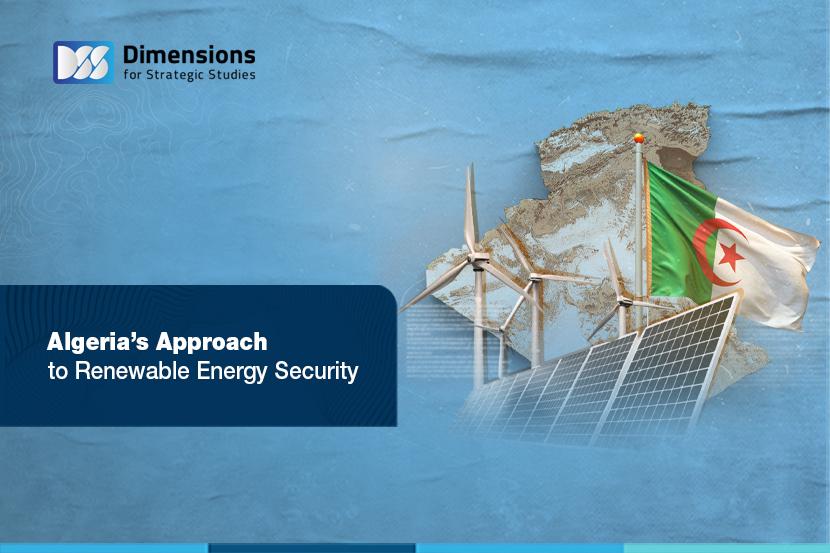
Algeria’s Approach to Renewable Energy Security
2024-10-306851 view
Download PDF
Executive Summary
As the world turns to renewable energy, with the European Union at its forefront, energy exporting countries are striving to keep pace with the trends set by importers. A prominent example is the case of Algeria, which has begun to shift to the production of renewables and seeking a leading position in this vast market, in keeping with its status among exporters of fossil fuels.
This analytical report addresses the security of Algeria’s future renewable energy sector, an increasingly important element of the country’s national security.
The paper examines Algeria’s ability to become a reliable and dependable source of renewable energy for export to international markets, especially Europe. It also reviews examples of Algerian-European partnerships in these fields, and Algeria’s motives in its quest to become a leading regional exporter of renewable energy.
The report concludes that Algeria is in line with the EU’s policies and orientations related to achieving energy security, through the transition from fossil fuels to renewable energy sources, and that the evidence suggests that Algeria and the EU view their energy partnership as serving their common interest from the economic, security and political perspectives.
Introduction
Algeria aspires to be a pioneer in the export of renewable energy, aiming to capture a share of that market no smaller than its share in the fossil energy market, especially in Algeria’s favoured market, the European Union.
The EU has advanced quickly in its transition to renewable energy as it attempts to find concrete solutions to resolve the fossil energy crisis caused by Russia’s war on Ukraine and interruptions to the supply of Russian gas.
However, the shift towards renewable energy did not originate with the Russian invasion of Ukraine: it is a global policy trend fuelled by world’s growing population, the increasing demand for energy, and the urge to reduce the carbon dioxide emissions that are causing climate change.
Renewable energy sources accounted for 35.4 percent of the world’s electricity consumption in 2022, [1] and experts forecast that by 2050, 95% of global demand will be met by renewables, including 100 percent of Africa’s needs. [2]
Many countries around the world are putting in place the policies and procedures needed to start the process of transitioning—even partially—from fossil fuels to renewable energy sources for electricity production. Investment in renewable energy has exceeded expectations, with the value of investments in the global renewable energy market in the first half of 2023 reaching a total of $358 billion . [3]
This analytical report reviews Algeria’s capacity and national goals for renewable energy production as it seeks to become a reliable exporter to for the European market, relying firstly on solar energy and secondly on wind. The cost of producing electricity from solar energy is cheap compared to the costs associated with wind turbines, which are expensive to build and maintain. This explains why solar energy projects are more widespread than wind energy projects in Algeria and other countries.
Conclusion
Many countries around the world, led by the European Union, have adopted policies and strategies to boost natural renewable sources in their energy mixes, and to support solar and wind energy investment projects, as well as producing green hydrogen through electrolysis based on renewable energy.
All these efforts have aimed to reduce carbon emissions and diversify energy sources, especially since Russian gas was cut off in the wake of the war in Ukraine.
These trends have pushed Algeria to seek to get ahead of the international curve, by proposing and implementing many projects in the field of renewable energy production and export, helping Algeria maintain its position and role in the international energy market, especially among its allies in the EU which, taken as a bloc, is the largest importer of Algerian energy.
Algeria’s energy policies reflect a desire to increase its share in the European market to capture the largest possible share in this market in the future, taking advantage of the geographical proximity to that market, which facilitates export operations.
Meeting the increasing demand for renewable energy will also keep financial resources flowing into Algeria, as well as maintaining its position in the European security and foreign policy equation, as an important provider that can ensure their energy security into the future.
Algeria’s renewable energy sector has the potential to strengthen and develop the country’s economy by bringing additional financial revenues to the state treasury, creating job opportunities, and revitalizing many areas in the centre and south of the country that play host to solar energy projects.
Click here to read the full report (in Arabic) .
resources:
[1] Energy Institute, Statistical Review of World Energy 2024 , Link.
[2] “Types of renewable energy,” EDF , 29 May 2024, Link.
[3] Meredith Annex, “Renewable Energy Investment Hits record-breaking $358 billion in 1H 2023,” BloombergNEF , 21 August 2023, Link.





